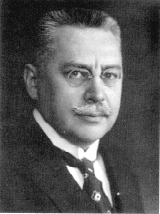| Profile | Major Works | Resources |
Ladislaus von Bortkiewicz, 1868-1931.

Russian statistician and economist, who worked in Germany for much of his career.
Ladislaus von Bortkiewicz was born and raised in St. Petersburg, Russia, from a family of Russian nobles of Polish descent. His father, a military man, taught at the local artillery school.
Bortkiewicz and studied at the university of St. Petersburg until 1890, subsequently producing a thesis in mathematical statistics for the academy of national economy.. Borkiewicz proceeded to continue his studies abroad, spending 1891 in Strasbourg and 1892 in Göttingen (producing his dissertation on the statistics of life-expectancy), before going on to Vienna and Leipzig. He was appointed as a lecturer (privatdozent) at the University of Strasbourg in 1895 until 1897, when he returned to St. Petersburg to take up a job with a railway company. But Bortkiewicz didn't last long outside academia. In 1901, he returned to Germany, and became professor of statistics and political economy at the University of Berlin (full professor after 1920) until his death in 1931.
While still a student, Borktiewicz reviewed Leon Walras's
work, and became an eminent advocate of mathematical economics.
However, his theoretical proclivities were more in the "Classical" Ricardian
vein Ladislaus von Bortkiewicz's main claim to fame is for his
work on Karl Marx - whom he simply saw as
one descendant of Ricardo, setting aside his
revolutionary reputation. Bortkiewicz's solution to the Marx's "Transformation
Problem" (1907) is considered legendary, although it was ignored at the time. Bortkiewicz was also involved in other theoretical controversies - particularly against Böhm-Bawerk and the Austrian
theory of interest and also against Alfred Weber's
theory of industrial location. Bortkiewicz also produced several notable
works on mathematical statistics (e.g. 1898, 1917), and is sometimes
credited as a co-discoverer (certainly a popularizer) of the Poisson
distribution.
Although he taught in Berlin most of his life, Bortkiewicz was nonetheless opposed to the German Historical School and was more sympathetic to the mathematical efforts of the Lausanne School. Wassily Leontief was among his students.
|
Major works of Ladislaus von Bortkiewicz
|
|
HET
|
|
Resources on Ladislaus Bortkiewicz
|
All rights reserved, Gonçalo L. Fonseca
